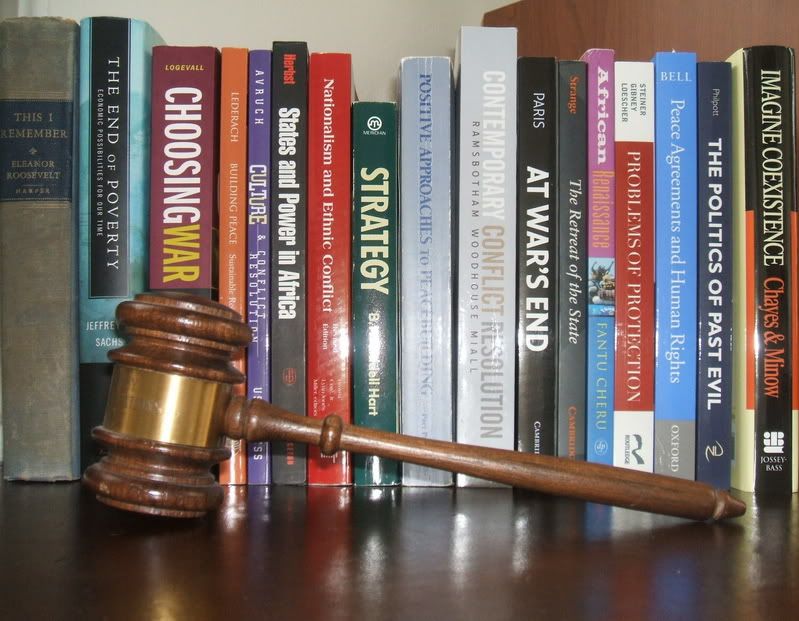As someone who follows African conflicts basically all the damn time, I feel obliged to weigh in on the Darfur issue right off the bat.
The conflict is Darfur is absolutely miserable. There are multiple factions, multiple agendas, multiple interpretations of history and the present, and multiple attempts to either end or ignore the conflict itself. I'm one of those that believes that genocide is in fact taking place, and that this has been the case for at least two years now. Finally, a
peace deal was signed late last week between the Khartoum government and the largest rebel faction, the SLM/A. Even though this has allegedly
opened the door for UN peacekeepers, I'm still not terribly hopeful about the situation.
My primary concern is that the peace deal was signed by only one of three major factions. See, for things like ceasefires to work, you kinda have to get all sides to cease firing. Further, I have absolutely no confidence in the Khartoum government. Even though it has been relatively faithful to the Comprehensive Peace Agreement (CPA) that it signed with forces that had been fighting in Southern Sudan, there is still evidence that President Bashir and his cronies still try to sidestep the South, while taking in part of its oil money.
But part of my concern lies with the rest of the world too. Thanks for your protest last week. That was important. But it was a little late, no? Where were you two years ago? What kind of world is it that genocide takes two years to get a response?
Oh wait, we're talking about Africans being slaughtered. See the Rwanda example.
Why the Western interest now? We realized there might be oil in them there desert hills.
I'm not trying to be overly cynical. There are, in fact, boatloads of people who have expressed their concern over Darfur from the very beginning. I applaud those people, and I wish that I had been more vocal myself. But what we haven't seen in two years is real international action.
The African Union stepped up when nobody else did or would. They have fielded a peacekeeping operation in Darfur since 2004, although that mission is too small and lacks key equipment and essential funding. The mission should and now likely will be replaced by a UN operation. Yet this won't be any ordinary UN peacekeeping mission.
A peacekeeping operation in Darfur must be massive. After all, we're talking about a place the size of France. It took 21,000 peacekeepers in Sierra Leone to secure a peace that was more stable and in a country far smaller. It took 17,000 in Liberia. There are 17,000 more in Democratic Republic of Congo, and they can only cover about a third of that vast country. There are 10,000 coming to Southern Sudan, but again, that peace is more stable. In Southern Sudan, the war had raged for 20 years and it ended as much out of exhaustion as it did a real desire for some sort of peace.
So what should a UN mission in Darfur look like? Personally, I think you need at least 50,000 troops, complete with tanks and lots of helicopters. Those fighting in Darfur have not shown signs of exhaustion and don't seem terribly keen on this peace deal. This will be more peace enforcement than peacekeeping. It will be the biggest thing the UN has ever done. It will be ridiculously expensive. It will require huge logistical support. And it is entirely necessary. One of my former co-workers half-jokingly referred to this as "the invasion option." I don't think that's quite accurate. We don't need to conquer anything, we just have to stop the massive bloodshed. The whole original concept behind peacekeeping was to simply stand between two parties and refuse to let them kill each other.
A gentleman I met with tonight suggested that we first needed to buy off some of the parties in Darfur. However, with the discovery of oil wealth in the region, it will be impossible to buy off the spoilers unless they are promised a cut of the revenues. But wealth and power sharing can also be ensured by expanding the Government of National Unity to include Darfur representatives, and in short, some sort of political voice for the disenfranchised. It won't be perfect, but it's a start.
The fact of the matter is that Sudan is crumbling. In five years, the South will likely exercise its secession option. I think those in Darfur would like a similar option. There is also brewing conflict in Eastern Sudan that will likely lead to calls for independence, or at least autonomy. That leaves the Khartoum dominated center, which, by the way, has no resources at its disposal.
Thus the best we can do is make the disintegration a relatively calm one. Bashir and company are going to fight tooth and nail to stop it, and thus must be contained. The situation therefore requires a tremendous show of international resolve if we are to prevent further slaughter.





